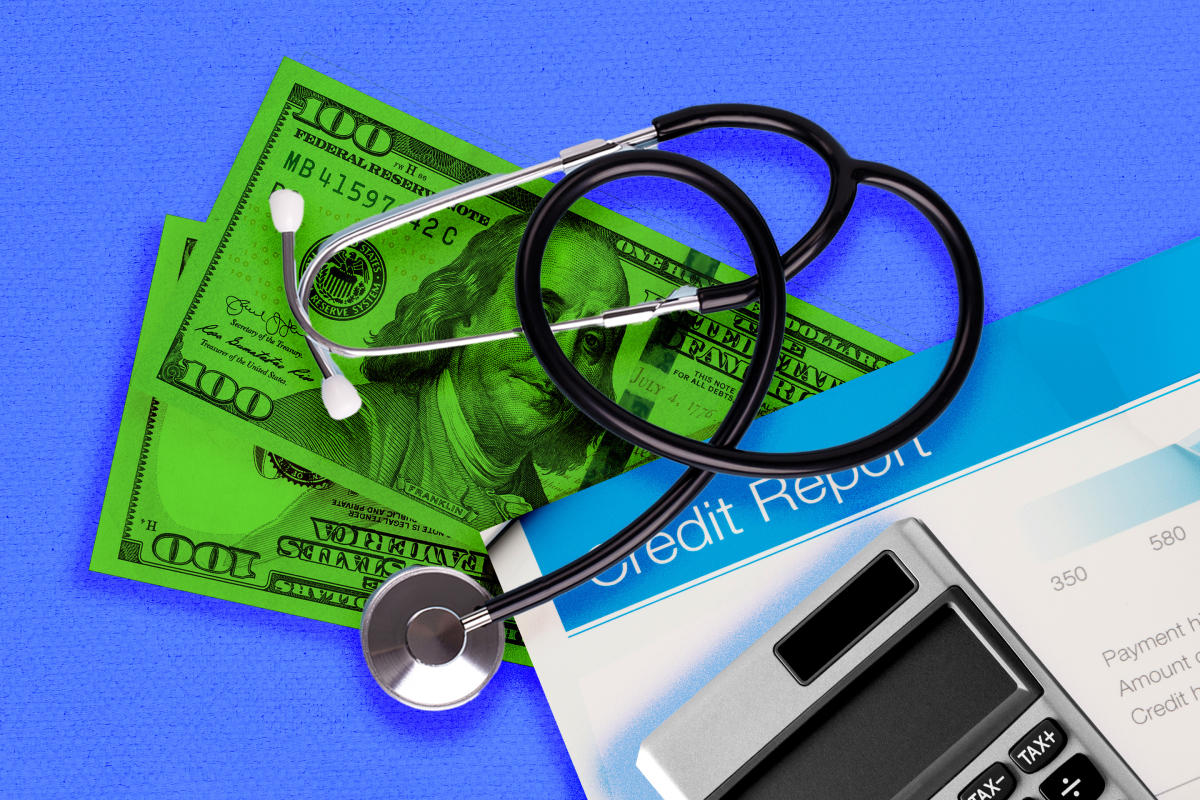Personal Finance
Medical Debt May Have Just Been Wiped Off Your Credit Report

Medical collections debt under $500 should no longer appear on your credit report, potentially boosting your credit score.
The three major credit bureaus — Experian, Equifax and TransUnion — said last week that they have finished scrubbing credit reports of any medical debt that went to collections for an initial balance under $500. This long-awaited action by the credit bureaus is part of a larger overhaul of how medical debt is now treated on credit reports.
Overall, the bureaus say this latest move has eliminated 70% of medical collections debt tradelines from Americans’ credit reports.
A tradeline is industry jargon for an account that appears on a credit report. An individual may have several tradelines of medical debt under $500, and each instance should have been removed. Tradelines for medical collections debt above that amount will still appear.
Key context
In March 2022, the big three credit bureaus unveiled plans to drastically reform how they treat medical debt on the credit reports that they produce.
The plan consisted of three core changes:
-
Paid medical debts were removed from credit reports in July 2022. Previously, medical bills that went to collections could blemish credit reports even after the debt was paid off.
-
Also that July, the bureaus implemented a new rule that extended the period of time for medical debt collections to post to your credit report. Before the change, unpaid medical bills in collections could start damaging your credit after six months. In July 2022, that period was permanently extended to a full year.
-
As of Tuesday, the bureaus implemented the final phase by wiping away each instance of medical collections debt under $500 that appears on their credit reports.
The credit bureaus’ reforms followed intense scrutiny by the federal government. In April 2022, the Consumer Financial Protection Bureau (CFPB) sued TransUnion for “deceptive marketing, regarding its credit scores and other credit-related products,” calling the company an “out-of-control repeat offender.”
-
Just before the lawsuit, the CFPB released a report finding that 43 million people had roughly $88 billion worth of medical debt on their credit reports, and that 58% of all collections debt on credit reports stems from medical bills.
-
“It’s hard to call medical debt a real debt,” CFPB Director Rohit Chopra said about the report. “Few people choose to take on medical debt, and typically, patients have no idea how much they will be charged for a service or a procedure.”
In a follow-up report analyzing the credit bureau’s changes, the CFPB said the $500-tradeline rule “will result in the majority of individual medical collections tradelines being removed from credit reports. However, in terms of dollar amount, a large majority of reported medical collections likely will still remain.”
In other words, even with a 70% reduction in the tradelines of medical collections debt, the majority of the $88 billion plaguing millions of Americans’ credit reports will still show up — because many people have lingering medical debts far over $500.
What it means for you
While some medical debt may still remain on credit reports, the recent changes are nonetheless significant. And following the removal of medical collections debt from credit reports, millions of Americans could see an improved credit score.
-
If you had medical collections debt under $500 on your credit report, pull your credit reports from the three credit bureaus to ensure that it no longer appears. If you had multiple instances of medical debt in collections, each instance should be removed so long as the total amount was under $500.
-
You can check your credit report for free each week with the three bureaus at AnnualCreditReport.com until the end of 2023. Be wary of scam sites when checking your report, and never pay if you don’t have to. AnnualCreditReport.com is the only site authorized by the federal government.
-
After you receive your reports, verify the medical debt was removed. Be on the lookout for other errors, too. If you notice incorrect information, you can dispute those errors and the credit bureau will have to investigate.
-
You can also submit credit reporting complaints to the CFPB online or by calling (855) 411-CFPB.
-
Keep in mind that the changes only affect what appears on your credit report and that the underlying medical debt has not been forgiven. You will need to pay any debts you still owe.
More from Money:
Hospital Bills Are Confusing and Expensive. Here’s How to Advocate for Yourself
An Opaque Web of Credit Reports Is Tracking Everything You Do
Dollar Scholar Asks: What Factors Make My Credit Score Drop?
© Copyright 2023 Money Group, LLC. All Rights Reserved.
This article originally appeared on Money.com and may contain affiliate links for which Money receives compensation. Opinions expressed in this article are the author’s alone, not those of a third-party entity, and have not been reviewed, approved, or otherwise endorsed. Offers may be subject to change without notice. For more information, read Money’s full disclaimer.
Read the full article here

-

 Side Hustles7 days ago
Side Hustles7 days agoExpand Your Global Reach with Access to More Than 150 Languages for Life
-

 Side Hustles6 days ago
Side Hustles6 days agoKFC Announces Saucy, a Chicken Tenders-Focused Spinoff
-

 Side Hustles7 days ago
Side Hustles7 days agoThis AI is the Key to Unlocking Explosive Sales Growth in 2025
-

 Investing6 days ago
Investing6 days agoPalantir, Anduril join forces with tech groups to bid for Pentagon contracts, FT reports By Reuters
-

 Side Hustles5 days ago
Side Hustles5 days ago4 Ways Content Can Make or Break the Customer Experience
-

 Passive Income3 days ago
Passive Income3 days agoWhy Emotional Intelligence Is the Key to High-Impact Leadership
-

 Side Hustles5 days ago
Side Hustles5 days agoHow to Build a Legacy of Leadership in Your Business in Six Proven Strategies
-

 Investing7 days ago
Investing7 days ago14 lessons from 2024 to remember in 2025: BofA By Investing.com


















